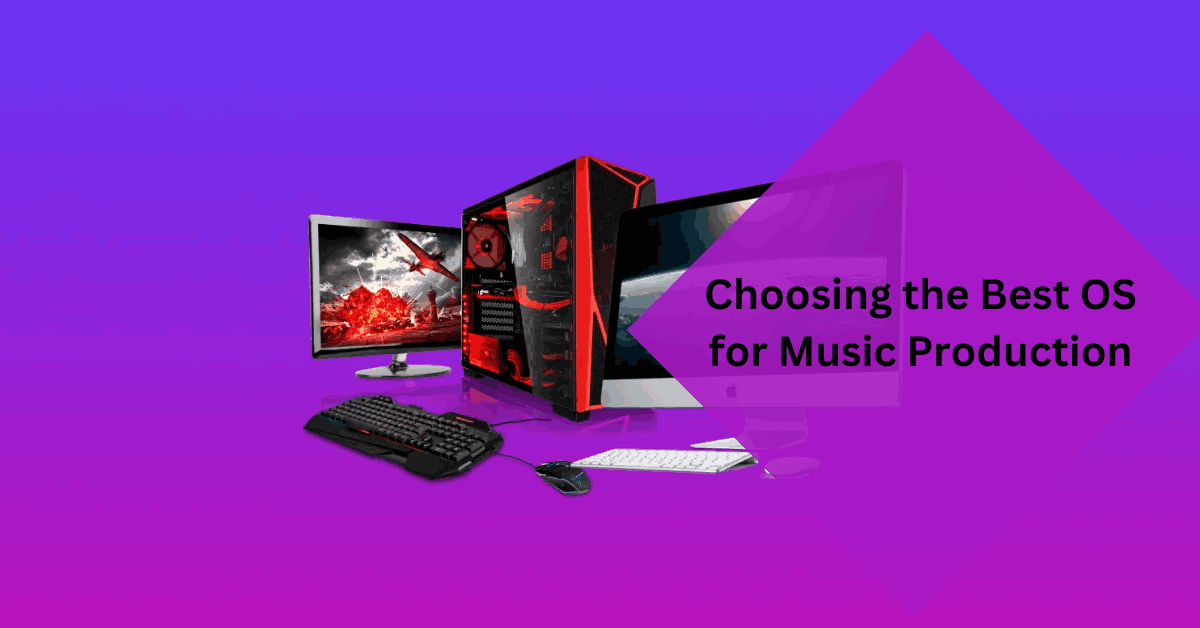Choosing the Best OS for Music Production
Electing an appropriate operating system is crucial in music production, impacting the functionality, performance, and overall creative experience. Various operating systems offer distinct features and tools tailored to meet production needs. The laptop choice for DJs may vary significantly from the needs of a studio producer, emphasizing the importance of customizing the operating system choice to specific requirements.
Windows:
Windows is recognized for its versatility, making it a popular choice in music production. Its compatibility with a broad range of software and hardware is a crucial advantage. This operating system is known for supporting numerous DAWs, plugins, and virtual instruments, catering to a broad spectrum of music production requirements. The flexibility of Windows allows for easy integration with various audio interfaces and MIDI controllers, essential for a seamless music production experience. With a large user base and frequent updates, this music production software is reliable for beginners and experts, with ample community support.
macOS:
macOS offers a streamlined and stable environment, favored for its seamless integration with Apple hardware. This operating system is renowned for its efficient performance with professional-grade music software, such as Logic Pro X and GarageBand. The optimized audio and MIDI environment in macOS ensures low-latency recording and high-quality sound processing. Its user interface and robust security features make it a preferred choice for producers who prioritize a hassle-free, secure production environment. The ecosystem of Apple products, including iPads and iPhones, can be effortlessly integrated, enhancing the creative workflow.
Linux:
The open-source nature of Linux presents unmatched customization opportunities. This operating system attracts producers who enjoy fine-tuning their systems. Linux supports various DAWs and music production tools but might require more technical skills for optimal setup and use. The power to tailor the operating system according to individual requirements is an invaluable benefit that cannot be overlooked. The community-driven approach offers a wealth of resources and support for troubleshooting and enhancements. For producers interested in exploring unique audio processing tools and experimenting with different production techniques, Linux is a highly adaptable option.
iOS and Android:
iOS and Android have gained traction in the mobile music production scene. These operating systems offer the convenience of working on the go. iOS is particularly notable for its robust selection of music production applications and efficient low-latency audio processing capabilities. Android, while slightly behind in professional audio features, still provides a variety of apps for music creation and editing. Both platforms support a range of portable interfaces and controllers, making them ideal for sketching ideas or producing music while away from the studio. Their touch interfaces open up new possibilities for creative expression and intuitive control.
Chrome OS:
It is a cloud-based operating system that is ideal for producers who prefer working with online tools and cloud storage. It is designed for speed and efficiency, handling web-based music applications effortlessly. Although it may not support advanced DAWs, it is well-suited for beginners or those seeking a straightforward approach to music production. Chromebooks, running on Chrome OS, are typically more affordable and offer long battery life, making them excellent choices for educational environments or those on a tight budget. The simplicity and ease of use of Chrome OS make it a compelling option for casual music-making and collaboration.
Specialized Music Production Operating Systems
Specialized music production operating systems provide environments optimized for audio work. These systems are engineered for low-latency audio processing and are compatible with a wide range of professional audio interfaces and hardware. They often include built-in tools and features specifically designed for audio production, offering enhanced performance and reliability. Although they may have a steeper learning curve and a smaller user base, these operating systems are ideal for advanced producers seeking a tailored, high-performance audio production environment. They represent the cutting edge of music production technology, often incorporating the latest advancements in audio processing.
Comparing and Making the Choice
When comparing operating systems, one must consider workflow, software and hardware compatibility, and overall system requirements. Stability, software availability, user interface, and future scalability should be evaluated. Prospective users should also assess each system’s community and technical support level. Thinking about how the operating system will fit into the current and future music production journey is essential. This careful consideration ensures that the chosen system not only meets current requirements but also supports future growth and development in the field of music production.
Conclusion
In summary, the right operating system can significantly impact the music production experience, like the ideal laptop choice for DJs, which can enhance a DJ’s performance. From Windows to stability, LiLinux’sustomization, the mobility of iOS and Android, the simplicity of Chrome OS, and the specialized nature of dedicated music production operating systems offer unique benefits. Considering personal requirements and future aspirations, an informed decision is crucial in selecting an operating system that suits current needs and supports ongoing creative growth and development in the dynamic world of music production.

